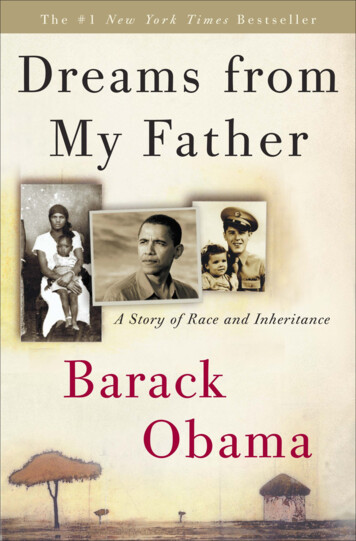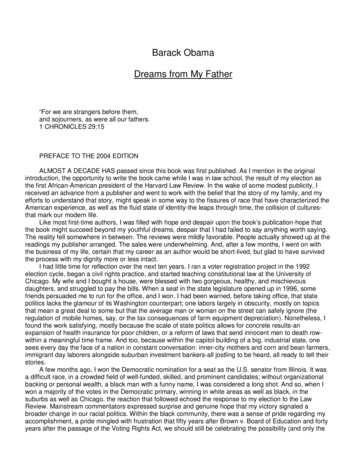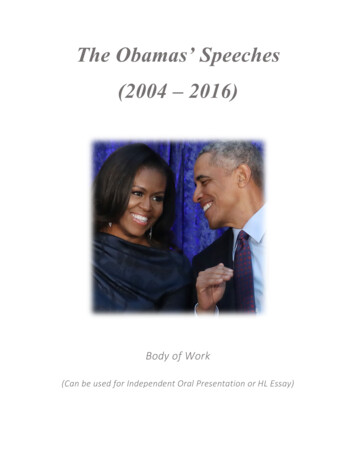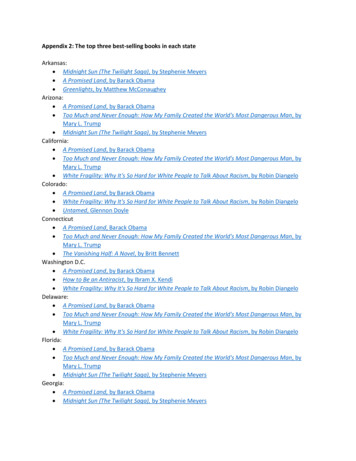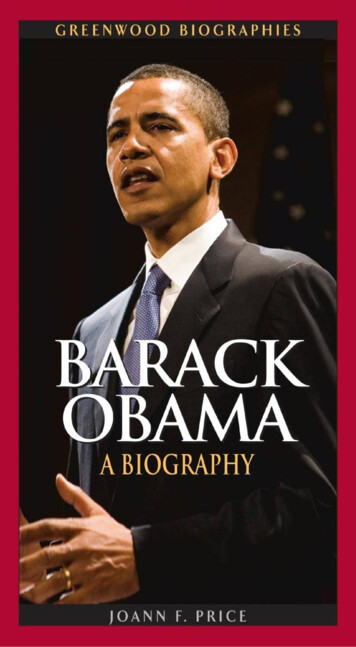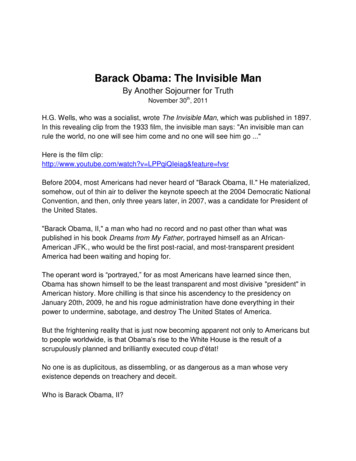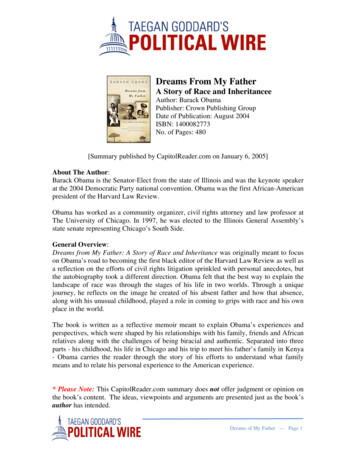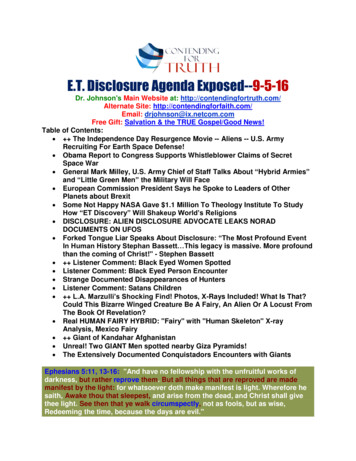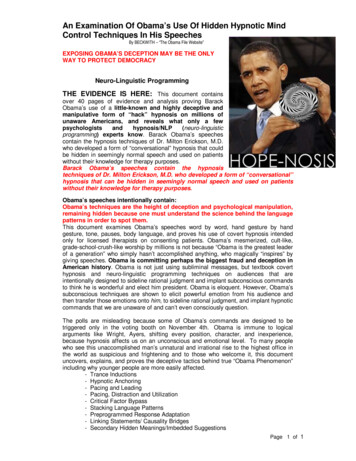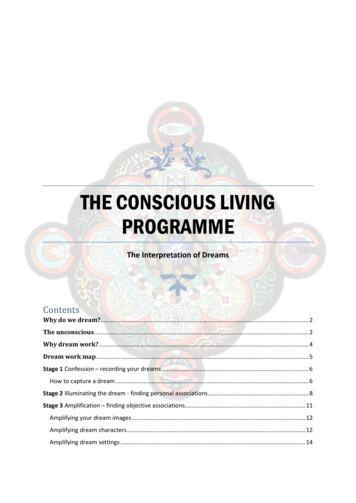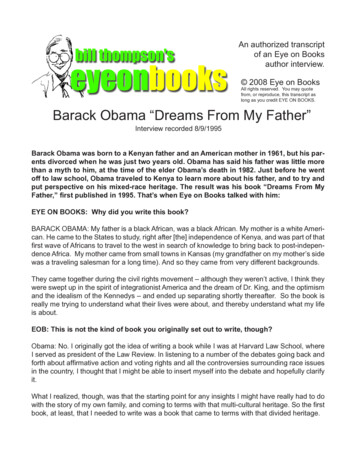
Transcription
An authorized transcriptof an Eye on Booksauthor interview. 2008 Eye on BooksAll rights reserved. You may quotefrom, or reproduce, this transcript aslong as you credit EYE ON BOOKS.Barack Obama “Dreams From My Father”Interview recorded 8/9/1995Barack Obama was born to a Kenyan father and an American mother in 1961, but his parents divorced when he was just two years old. Obama has said his father was little morethan a myth to him, at the time of the elder Obama’s death in 1982. Just before he wentoff to law school, Obama traveled to Kenya to learn more about his father, and to try andput perspective on his mixed-race heritage. The result was his book “Dreams From MyFather,” first published in 1995. That’s when Eye on Books talked with him:EYE ON BOOKS: Why did you write this book?BARACK OBAMA: My father is a black African, was a black African. My mother is a white American. He came to the States to study, right after [the] independence of Kenya, and was part of thatfirst wave of Africans to travel to the west in search of knowledge to bring back to post-independence Africa. My mother came from small towns in Kansas (my grandfather on my mother’s sidewas a traveling salesman for a long time). And so they came from very different backgrounds.They came together during the civil rights movement – although they weren’t active, I think theywere swept up in the spirit of integrationist America and the dream of Dr. King, and the optimismand the idealism of the Kennedys – and ended up separating shortly thereafter. So the book isreally me trying to understand what their lives were about, and thereby understand what my lifeis about.EOB: This is not the kind of book you originally set out to write, though?Obama: No. I originally got the idea of writing a book while I was at Harvard Law School, whereI served as president of the Law Review. In listening to a number of the debates going back andforth about affirmative action and voting rights and all the controversies surrounding race issuesin the country, I thought that I might be able to insert myself into the debate and hopefully clarifyit.What I realized, though, was that the starting point for any insights I might have really had to dowith the story of my own family, and coming to terms with that multi-cultural heritage. So the firstbook, at least, that I needed to write was a book that came to terms with that divided heritage.
Barack Obama “Dreams From My Father”Eye on Books interview transcript Page 2EOB: Is it then an oversimplification to say you had to get your own house in order, inyour mind, before you could work on the country’s?Obama: Well, I certainly think that you have to know where you’ve been if you want to knowwhere you’re going. For someone who comes out of a family and a background that’s both blackand white, that’s an especially important process that one has to go through.We live in a land of strangers. Blacks and whites don’t know each other, they don’t know theirstories very well. Within my own family, even in the best-meaning family, there’s a tremendousscope for misunderstanding, for suspicion, for fear. Until I understood what those fears were,what those hopes were, and what those dreams were, I think I was destined to - potentially, atleast - repeat some of the mistakes that my parents and grandparents had made.EOB: All of that, thirty years after Dr. King and the civil rights movement. This seems almost incredible to me, at times, to think that in thirty years, this is all the progress we’vebeen able to make?Obama: Well, you know, it is frustrating, I think. I talk a lot in the book about my attempts torenew the dream that both of my parents had. I worked as a community organizer in Chicago,[and] was very active in low-income neighborhoods working on issues of crime and educationand employment, and seeing that in some ways certain portions of the African-American community are doing as bad, if not worse, and recognizing that my fate remained tied up with theirfates. That my individual salvation is not going to come about without a collective salvation forthe country.Unfortunately, I think that recognition requires that we make sacrifices, and this country has notalways been willing to make the sacrifices necessary to bring about a new day and a new age.EOB: Would this book properly be called an autobiography, though?Obama: Well, you know, I have not been completely comfortable with calling it an autobiography. I get the image, when I talk about autobiographies, of famous generals writing about theirwar exploits, or movie stars talking about their love interests. Obviously, at the age of thirtythree, when I finished writing it – I just turned thirty-four – my experiences are only part of mylife, and I haven’t achieved any closure yet, hopefully. What I would describe it as is more of afamily history. I think it’s an oral history, a narrative of a family trying to understand itself, andme as an African and an American trying to understand my place in a divided society.
Barack Obama “Dreams From My Father”Eye on Books interview transcript Page 3EOB: What was the most difficult part of the book to write?Obama: I think what was toughest was writing honestly and truthfully about the suspicions andhurts and failings of the people closest to me, and writing about those same failings and disappointments and blind spots in myself. I think whenever we talk about race there are all kinds ofissues we’d like to skirt. You know, I tell the story – just to take one of the clearest examples – ofmy grandmother, who loves me dearly and has made all kinds of sacrifices on my behalf, expressing at one point when I was a teenager her fear of black men on the streets. To discuss thathonestly, and to discuss how that felt, to discuss how my grandmother felt, and then to be ableto arrive at some sort of peace with that, some greater understanding and some forgiveness, Ithink was probably the most difficult part of writing it.EOB: Were there times when you felt like just backing away from the whole thing and saying, I don’t think I can go through with this?Obama: Well, certainly, I think there’s an impulse among all of us to shy away from these issues.There’s a certain race-weariness that confronts the country, precisely because the questions areso deeply embedded and the solutions are going to require so much investment of time, energyand money. So I share that reluctance, sometimes, to explore these issues.I think what kept me going is the recognition that we can’t solve these problems by ignoring themor pretending that they don’t exist. One of the things that strikes me, and the country, right nowis our tendency to either pretend that racial conflict does not exist, that racial division and hatreddoes not exist, and to pretend that we live in a color-blind society – I think sometimes membersof the Supreme Court, the current Supreme Court, take that line – or to say that race is everything, that there is no possibility of common ground between black and white.I think the truth of the matter is, and hopefully what people will get out of the book, is some sensethat although the lives of blacks and whites in this country are different, although our historicalexperiences are different, my family is an example – and hopefully I am an example – of the possibility of arriving at some common ground, and that we do share values and principles aroundwhich we can organize and make for a better life.EOB: What did it feel like to be in Africa and actually walk the land your father walked?Obama: You know, it was a wonderful experience in some ways. I think it was also a soberingexperience in a lot of ways. I did not know my father well, growing up. My return to Africa sort ofserved a dual function. Part of it was a very personal journey to piece together my father’s storyand figure out who he was.
Barack Obama “Dreams From My Father”Eye on Books interview transcript Page 4[And] part of it was a journey that I think a lot of African-Americans think about making, andsometimes actually make, to return to the motherland, so to speak, and to understand what ourroots are. In this trip I end up combining both those things, and I think what I experienced was,on the one hand, the joy of connecting with a part of myself that I wasn’t as familiar with as Ineeded to be. At the same time I think it also dispelled a lot of myths and idealization of Africathat I think is important. These days – because, I think, of the problems that African-Americansface in this country – we tend to have a sanitized view in the African-American community aboutwhat is going on in Africa. And the truth of the matter is that many of the problems that Africafaces, whether it’s poverty, or political suppression, or ethnic conflict, is [sic] just as prominentthere, and can’t all be blamed on the effects of colonialism. What it can be blamed on is some ofthe common factors that affect Bosnia or Los Angeles or all kinds of places on this earth, and thatis the tendency for one group to try to suppress another group in the interest of power or greedor resources or what have you.EOB: Well, in the end, has doing this book helped you sort through those larger issueswith any greater ease?Obama: I think the book, to some degree, was cathartic. I think what it did was to help me reclaimboth sides of my heritage, helped me to understand that I think most of my life had been – andhas been – spent in pursuit of values and principles that I can live by, as an individual, and thatI think all groups can share.And I think the element of forgiveness was also important. I think it was important for me tounderstand that the forces that shaped my father were not so different from the forces that hadshaped me, that he was also struggling, as an African, with the cross-pollination of cultures, theentrance of Africa from a traditional society into a modern society. And by understanding whathe had gone through, I think it better prepared me to face the struggles that I’m continuing to gothrough.EOB: I’m wondering if the ethnically-mixed couple of today, if when their child is thirtyfour years old, if they’ll find it any easier to deal with these issues than you have foundit?Obama: That’s an interesting question. I’m not sure. I think in some ways there’s less novelty tothe idea of mixed couples. They’re not seen as lurid or perverse in ways that I think they werethirty years ago. I think that this country is inevitably going to be undergoing changes simply dueto demographics. There’s been a lot of talk about the “browning of America” .
Barack Obama “Dreams From My Father”Eye on Books interview transcript Page 5EOB: I was just going to use that same phrase .Obama: . and I think that is going to be happening. We can’t ignore it. I think whether or not mychildren or your children will have to struggle with these same issues depends on what we do,and whether we take some mutual responsibility for bridging the divisions that exist right now.And I really want to emphasize the word “responsibility.” I think that whether you are a whiteexecutive living out in the suburbs, who doesn’t want to pay taxes to inner-city children for themto go to school, or you’re an inner-city child who doesn’t want to take responsibility for keepingyour street safe and clean, both of those groups have to take some responsibility if we’re goingto get beyond the kinds of divisions that we face right now.
Barack Obama "Dreams From My Father" Interview recorded 8/9/1995 Barack Obama was born to a Kenyan father and an American mother in 1961, but his par-ents divorced when he was just two years old. Obama has said his father was little more than a myth to him, at the time of the elder Obama's death in 1982. Just before he went
